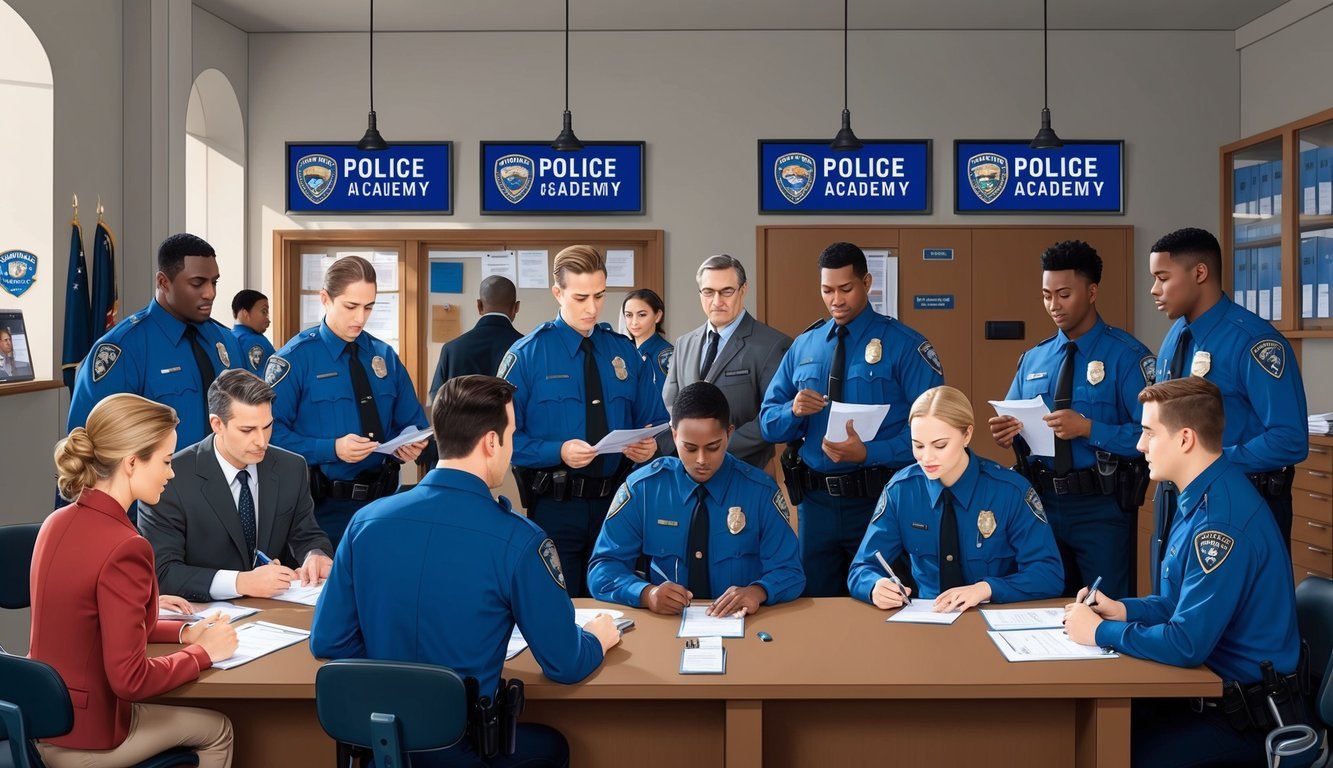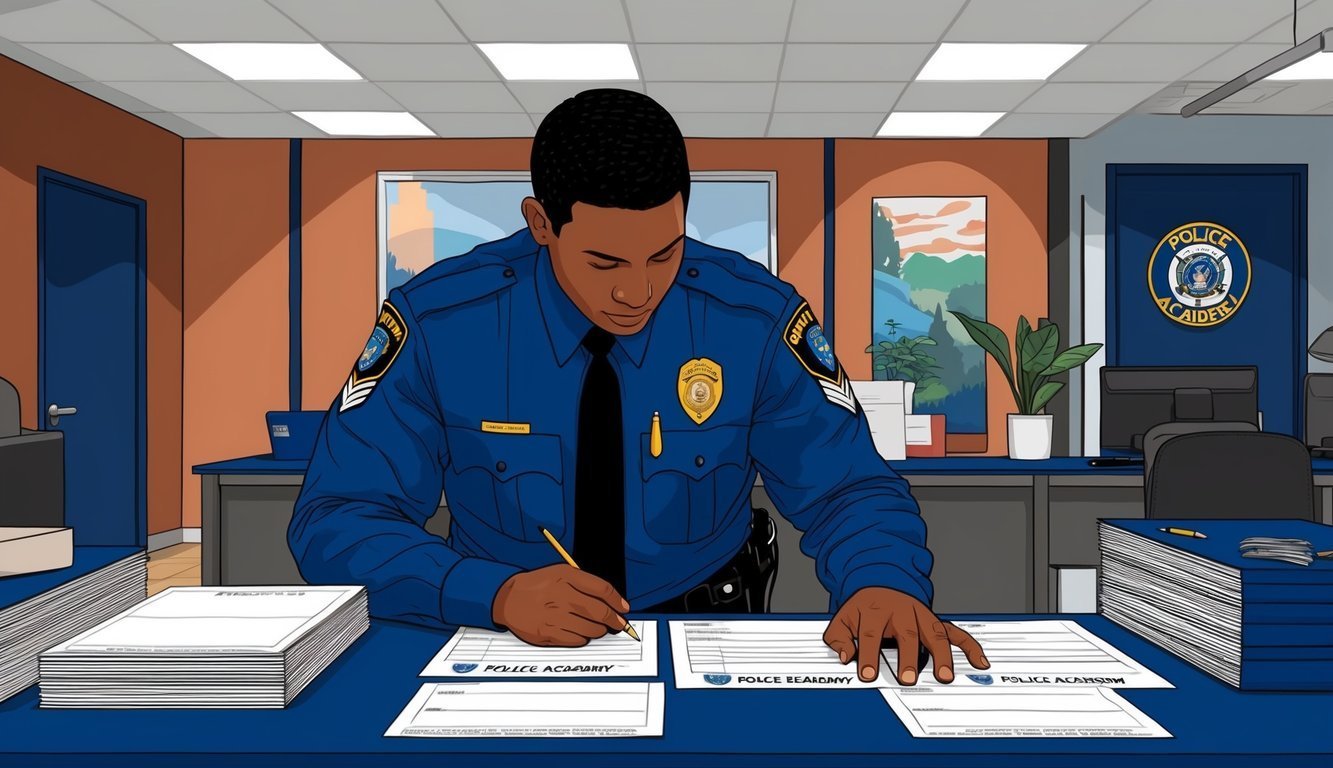“`xml
Thinking about a career in law enforcement? The first step on that journey is joining the police academy! Sure, the whole process can feel a bit overwhelming, but if you’re prepared, you can knock it out of the park. To sign up for police academy, you’ve got to hit some basic eligibility requirements, ace physical and written tests, and submit an application to your local law enforcement agency.

Your adventure to becoming a police officer begins with a little research.
Each state and local agency has its own rules, so it’s critical to check out what’s needed in your area.
Generally, most places want applicants to be at least 18 years old, have a high school diploma, and pass a background check. Oh, and physical fitness? That’s a big deal! If you haven’t started working out, now’s the time to lace up those sneakers.
Once you feel ready to apply, gather up your documents and fill out the forms with care.
If you’re lucky enough to get through the initial screening, you’ll face a series of tests.
You might have to take written exams, go through interviews, and endure physical challenges.
If you make the cut, you’ll be invited to join the academy! Training there is where the real magic happens—think emergency response, teamwork, and fire prevention.
If you’re also curious about becoming a firefighter, you could check out how to sign up for that role on official department websites or recruitment events.
Just know that training typically lasts anywhere from 16 to 40 weeks and dives into everything from legal knowledge to self-defense skills.
Key Takeaways
- To apply, candidates need to meet age, education, and background check requirements.
- Physical fitness and written tests are part of the application process.
- Academy training covers essential legal knowledge, physical skills, and police strategies.
Eligibility and Application
Getting into the police academy means meeting some specific requirements and putting together a solid application.
This process ensures that only qualified candidates make it to law enforcement training.
Meeting the Minimum Requirements
To become a police officer, you’ve got to tick off a few boxes.
Most departments require you to be at least 21 years old, and a high school diploma or GED is a must.
Having good moral character is essential.
This generally means a clean record—felonies can put a big dent in your plans.
Some minor misdemeanors might slide, but that really depends on the department.
And let’s talk fitness.
Many academies will test your strength and stamina, so it’s smart to hit the gym before you apply.
Assembling the Application Packet
Once you’ve checked off the basic requirements, it’s time to dive into your application.
The application process can feel like a marathon.
You’ll need to gather up a few documents:
- Birth certificate
- Social security card
- Driver’s license
- High school diploma or GED certificate
Most departments will also run a background check.
They’ll peek into your work history, education, and any past legal troubles.
Get ready for a written exam, too.
It’ll test basic reading and writing skills.
Some spots might even require a physical fitness test as part of the whole application gauntlet.
And let’s be real—honesty is key here.
Don’t try to hide your past; it’s better to own your mistakes rather than get caught in a fib.
Academy Training and Skills Development
The police academy training covers a broad range of skills and knowledge.
Recruits dive into physical fitness, law enforcement basics, and hands-on tactical skills.
These areas prepare future officers for the often unpredictable world of police work.
Physical Conditioning and Fitness
The Columbus Police Training Academy really hammers home the importance of physical fitness.
Recruits go all out with running, strength training, and agility drills, plus tackling tough obstacle courses.
A typical week of fitness training might look a little like this:
- Monday: 5-mile run and upper body strength
- Wednesday: Sprint intervals and core exercises
- Friday: Obstacle course and lower body strength
Recruits have to crush fitness tests throughout their time at the academy, checking everything from how fast they can run a mile to how many push-ups they can pump out.
The goal? Build up the strength and endurance that’s going to be crucial on the job.
Law Enforcement Education
Classroom learning makes up a huge part of academy life.
Recruits dig into criminal law, police procedures, and ethics.
They also learn about community policing and how to handle sensitive situations like domestic violence calls.
Some key subjects they’ll tackle include:
- Constitutional law and civil rights
- Criminal investigation techniques
- Cultural diversity and bias awareness
- Report writing and documentation
These recruits take a lot of tests to ensure they’ve got the law down cold before they hit the streets.
The academy teaches them how to connect with diverse communities and build trust — two essential skills for effective policing.
Tactical and Practical Skills
Hands-on training is where the rubber meets the road.
Recruits learn proper firearm usage and practice defensive tactics.
They even get some wheel time to master emergency vehicle operations.
Here are some of the important skills they work on:
- Firearms training and target practice
- Arrest techniques and handcuffing
- First aid and CPR certification
- High-speed pursuit driving
The Columbus Police Academy packs in over 1,200 hours of training, including 40 hours of realistic, scenario-based exercises.
Recruits practice everything from traffic stops to building searches—basically a crash course in what the job will actually entail.
Frequently Asked Questions
Requirements for police academy, age limits, application steps, training costs, and pay options can really vary based on location.
These details can make a big difference in how you journey toward becoming a police officer.
What are the requirements to apply for a Police Academy?
Applicants usually need to be U.S. citizens with a high school diploma or GED.
Passing background checks and keeping a clean criminal record are also crucial.
A physical fitness test and vision tests are common, too.
And don’t forget that some academies might require a valid driver’s license.
Is it possible to join the Police Academy at 18?
The majority of police academies set the minimum age at 21.
A few may allow 18-year-olds to apply, but it’s not the norm.
If you’re younger, you might need some extra qualifications or face a more competitive environment.
What steps should I follow to apply for a Police Academy near me?
First, do your homework on local police departments and their specific requirements.
Reach out to them for application details.
Fill out the necessary forms and submit the required documents.
Then, prepare for written tests and physical challenges, followed by interviews and background checks.
How much does Police Academy training typically cost?
Tuition might fall anywhere from a few thousand dollars to over $20,000.
Some departments foot the bill for recruits, and don’t forget there may be extra costs for uniforms, books, and gear.
How long does police academy training last in various states?
The duration of training varies by state and program, but most academies roll on for 16 to 40 weeks.
Some intense programs might be shorter, while others could stretch up to a year, depending on state laws and departmental needs.
Can you receive payment while training at the Police Academy?
Some police departments do offer pay for recruits during their training, while others provide stipends or reimbursements after they complete their program.
Many academies function like educational programs without pay, so it’s smart to check with local departments about their policies.
“`

